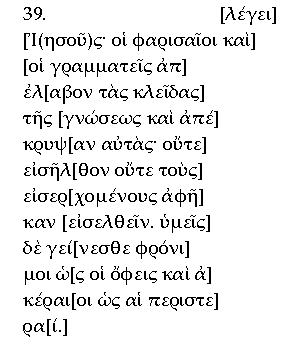Visitor Comments
The right to access to spiritual understanding has been seized by authorities who do not in fact themselves understand. They have forbidden the common man, not a member of this privileged group, to seek knowledge of spiritual reality. Keep a low profile in your spiritual seeking: mild like a dove to put no one into opposition to you and like a snake in your inconspicuousness. Thus you will be safe to seek knowledge.
- active-mystic
When you have the key, enter and proclaim the way.
- Ardele
The Pharisees had the meat but had lost the recipe. You, my students, will be shown what is needed & how to acquire [steal] that recipe.
- Thief37
Wow! Jesus tells us that the religious leaders did not go through the passage of spirituality and much worse they actually blocked those seeking truth from finding it. Unfortunately he didn't follow his own advice about keeping a low profile.
- taoito
|
Scholarly Quotes
Pseudo-Clementine Recognitions 2.30.1 states: "Similarly also he attacks the scribes and Pharisees during the last period of his teaching, charging them with improper actions and incorrect teaching, and with hiding the key of knowledge that they received, handed down from Moses, by which the gate of the heavenly kingdom may be opened."
F. F. Bruce writes: "The saying (the Greek original of which is preserved fragmentarily in P. Oxy. 655. 3) is practically identical in its first part with Luke 11.52 and in its second part with Matthew 10.16b. The 'knowledge' (gnosis) of the first part was probably interpreted in a Gnostic sense; the same idea is expressed in Saying 102. As for the second part, the Naassenes or Ophites (from the Hebrew and Greek words for 'serpent', nahash and ophis respectively) may have seen special significance in the 'prudence' of the serpent." (Jesus and Christian Origens Outside the New Testament, p. 129)
J. D. Crossan writes: "Of the twelve lines in this saying's Greek version, the first two are totally missing and the others contain only from two to five letters at the start of each line. Nevertheless, when the Greek text is restored in the light of the Coptic translation, it agrees substantially with its content (Hofius: 191; Kraft: 255; Fitzmyer, 1974:413-414). I give it in Fitzmyer's restoration and translation, but indicating the lacunae involved: ['Jesus says, "The Pharisees and the scribes have] re[ceived the keys] of [knowledge and have] hid[den them; neither have they] enter[ed nor permitted those who would] enter. [But you] bec[ome wi]se a[s the serpents and g]uileless [as the dov]es' (see also Hennecke and Schneemelcher: 1.112-113)." (In Fragments, p. 33)
Joseph A. Fitzmyer writes: "While E. Jacquier (RB 15 [1918] 117) was inclined to regard this saying as authentic, it is much more likely that in its present form it is a conflation of two canonical sayings." (Essays on the Semitic Background of the New Testament, p. 414)
R. McL. Wilson writes: "Fitzmyer thinks this a conflation of two canonical sayings, but once again it may be doubted if the solution is quite so simple. The scribes and Pharisees (in that order) come from Matthew, the key (singular) of knowledge from Luke; but Luke has 'taken away the key' and the saying is addressed to the scribes. Moreover, the final sentence of this section again comes from Matthew; Luke has 'prevented' for 'did not allow.' In addition, the text of Thomas shows some relation to the quotations of this saying in various documents of early Christian literature. Harnack and Michelson had already linked the Greek fragment with the ps.-Clementines. Here the possibility of independent tradition would accordingly appear to merit further investigation." (Studies in the Gospel of Thomas, pp. 75-76)
Gerd Ludemann writes: "This verse [wise as serpents] derives from Matt. 10.16b, for that passage is redactional. But in that case it is also probable that vv. 1-2 are dependent on Matt. 23.13, all the more so as in both Thomas and Matthew this saying is directed against the Pharisees and scribes (Luke: against experts in the law)." (Jesus After 2000 Years, p. 609)
Funk and Hoover write: "Matthew and Thomas direct this saying against Pharisees and scholars; Luke against legal experts. In Thomas the saying is a warning; in Matthew and Luke it is a condemnation. Matthew accuses the Judean leaders of slamming the door of Heaven's domain in people's faces; in Luke and Thomas the leaders are accused of confiscating the key or keys of knowledge and preventing others from discovering them. The 'keys of knowledge' probably referred to special rules used to interpret scripture, possibly to confirm a particular sectarian understanding." (The Five Gospels, p. 495)
Helmut Koester writes: "In this saying, Thomas mentions explicitly the Pharisees and scribes. 'Scribes and Pharisees' (Matt 23:12) is most likely the designation used in Q, rather than the typically Lukan 'lawyers.' On the other hand, the notorious Mattean addition 'hypocrites' (fourteen times in Matthew) is missing in Gos. Thom. 39. Thomas preserves the original form of this saying." (Ancient Christian Gospels, p. 92)
Funk and Hoover write: "This saying [Sly as a snake], which may have been proverbial, is a paradox: it advises one to be both a dove and a snake at the same time, which is a combination of two incompatible things. Its paradoxical character commended it to the Fellows as something Jesus might have said. On the other hand, the contexts in both Matthew (10:16) and Thomas afford no clues to how Jesus may have applied it. The admonition may refer to the combination of shrewdness combined with modesty." (The Five Gospels, p. 495)
|

